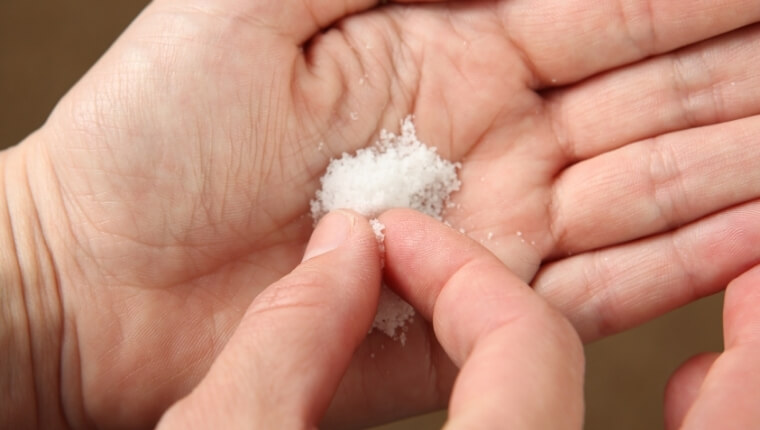In this article, I will try to guide you through the facts and all the benefits of adding salt to coffee.
As coffee lovers, we all have our unique preferences in how we take our cups of coffee. Some prefer it black with two teaspoons of sugar, while others like it with whipped cream and sweeteners.
Regardless, all coffee lovers know what good coffee tastes like. That’s why in every office, there’s always one person who isn’t allowed to make coffee for the team.
An old trend in the coffee community is resurfacing: adding salt to coffee. This may sound strange, but studies have shown that it can make your coffee taste better. In fact, many coffee lovers now recommend adding a pinch of salt to your steaming mug.
Adding salt to coffee is not a new practice. Several cultures worldwide have been adding salt to their coffee for a long time.
For example, the Hungarians, Siberians, and Scandinavians brewed their coffee in brackish water, which is a mildly salty solution resulting from the mixture of saltwater and river water. In Northern Scandinavia, people used brackish water for all their cooking needs, including making coffee.
Whenever clean water was available, the coffee didn’t taste as good, so they resorted to brackish water just for making coffee, passing on this tradition through generations.
With studies now backing up the claims that salt enhances coffee flavor, adding a pinch of salt to your coffee might be worth a try.
The Alton Brown Trick
The mention of salt in coffee probably brings up Alton Brown, the cookbook author and a food scientist who advocated for adding salt in coffee to reduce bitterness. He recommends adding a bit of kosher salt ground coffee to help tone down the bitterness and smoothen out the stale.
What Makes Coffee Bitter?
Roasting.

While many of us think that it’s the caffeine that makes coffee bitter, it turns out that that’s not necessarily the case. Researchers at the Technical University of Munich, Germany found out in their experimentation that the caffeine component that is naturally occurring in the green beans only accounts for 15% of the bitterness in coffee.
The rest is majorly due to the two compounds: Chlorogenic acid lactones and phenylindanes. These compounds are antioxidants, and they only appear in roasted beans.
Roasting your beans slightly results in the formation of chlorogenic acid lactones, while further burning leads to the breakdown of your grounds into Phenylindanes. Thus, the more strongly roasted your grounds are the bitter the brews.
5 Benefits of Adding Salt to Coffee

1. Reduce the Bitterness of Coffee.
Although you may prefer your coffee a certain way, sometimes you have to settle for bad coffee because you don’t have access to your own kitchen or don’t have time to make a fresh cup. You gulp down the bitter coffee, grimace, and say, “Oops! That was quite a morning!”
But have you ever tried adding a bit of salt to your coffee? You’ll notice a difference in taste. It may be subtle, but adding salt to coffee can cut the bitterness and improve the taste.
The tongue’s surface contains tens of thousands of taste buds capable of identifying five basic tastes:
- salty,
- sweet,
- bitter,
- sour,
- umami.
When food comes into contact with these taste buds, a chemical reaction is triggered, which transmits a signal to the brain to identify the taste.
The mechanism for producing four of the five tastes (sweet, salty, sour, and umami) is similar. Adding salt to coffee amplifies these four tastes. Bitterness, however, has a different mechanism, which can be combatted by salt. Instead of the normal reaction, the receptors release calcium ions that send a bitter signal to the brain. Adding salt impedes this reaction and prevents the brain from identifying the substance as bitter.
If you want to make your coffee less bitter and more drinkable without adding lots of sweeteners, consider brewing it with salt additives.
Read next: Why Is My Espresso Bitter? (3 Ways To Fix It)
2. Improves Stale Water.
The smell of stale water can affect the taste of your coffee. Water that sits for a long time can become stale and less effective in brewing coffee. Using stale water may also result in inconsistent extractions. However, adding salt to your coffee can improve the quality by even out the stale taste of old water.
In addition, salt makes the water denser, resulting in coffee with a thicker texture.
If you don’t want to look for fresh mineral water or want to reduce water waste in your household, simply add salt to improve old water that has been in the coffee machine for a while.
3. Salt in Coffee Enhances the flavor.
We all have different flavor preferences, and natural coffee without additives (with the exception of sugar) may not be appealing to some. If you’re one of those people, try this kitchen hack.
Just as we add salt to lemonade to improve its taste, salt can have the same effect on coffee. It can enhance the subtle fruity taste of coffee grounds, but keep in mind that different types of beans will give you different results. Experiment until you find the beans that give you the desired taste when salt is added, and once you find the perfect balance, you’ll probably want to repeat it.
Studies have shown that adding salt to coffee enhances flavor by suppressing bitterness.
4. Salt in Coffee Has Health Benefits
Coffee has several health benefits, such as nutrients like potassium, magnesium, and antioxidants. It also provides an adrenaline boost, improves energy levels, and aids in burning fat. Drinking coffee can reduce the risk of medical conditions such as dementia, Parkinson’s, and Alzheimer’s. (source)
However, the health benefits of coffee are best experienced when it’s taken naturally, without additives. Adding empty calories like cream, syrups, and sugar make coffee less healthy, without adding any benefits to the pot except for making the coffee more drinkable.
Using salt as a substitute for all the other additives not only eliminates empty calories but also replenishes your sodium levels. Studies have shown that drinking only four cups of coffee a day can result in the loss of 1200mg of sodium. Since the primary component of salt is sodium, adding salt to your coffee can increase your sodium intake levels.
5. Reduces Acid Reflux
Acid reflux is a common issue faced by coffee lovers, with light and medium-roasted coffee typically being the most acidic.
This can lead to a compromise between acidity and bitterness, which tend to be worse at opposite extremes.
However, adding a pinch of salt can make acidic coffee less acidic, reducing the need to look for less acidic coffee types, such as Arabica.
Does Salt In Coffee Reduce Acidity?
No, adding salt to coffee does not reduce acidity. While it may seem counterintuitive, adding salt to coffee does not neutralize the acids present in the coffee. Instead, it can mask the bitter taste of over-extracted coffee or enhance the flavor of some low-quality coffee blends.
Salt is a flavor enhancer that can help to balance the flavors in coffee and reduce the bitterness of certain coffee blends. However, it does not actually change the pH level of the coffee, which is what determines its acidity.
If you are looking to reduce the acidity of your coffee, you may want to try switching to a coffee blend that is naturally low in acid or opting for a cold brew coffee, which tends to be less acidic than hot brewed coffee. You could also consider adding milk or cream to your coffee, as the fats in these dairy products can help to neutralize some of the acids in the coffee and make it less acidic.
Read next: Why Is My Espresso Sour? (7 Ways How To Fix It)
Does Coffee Have Naturally Occurring Salt in It?
Yes, there can be some naturally occurring salt in brewed coffee due to the presence of minerals in the water used for brewing. On average, a cup of coffee may contain about 2mg of sodium per 100g, which is a very small amount.
How Much Salt Should You Add to Your Coffee?

When it comes to the quantities, there isn’t a determined formula or a rule to live by, so try different amounts per cup until you find one that gives you the right taste. For some, a pinch will do while others may start off with a little bit more than just a pinch.
The popular cookbook author Alton Brown recommends adding a quarter teaspoon of kosher salt to 6 teaspoons of coffee grounds to neutralize bitterness, reduce acidity and enhance sweetness.
Amounts also vary depending on the type of salt that you are using. Some salts are known to be saltier than others, and for such, you will have to use considerably less.
Are There Any Health Benefits of Salt in Coffee?
While adding salt to coffee does not directly offer any significant health benefits, here are five potential benefits of adding salt to coffee:
- Enhances flavor: Salt is a flavor enhancer that can help to balance the flavors in coffee and reduce the bitterness of certain coffee blends. This can lead to a more enjoyable coffee-drinking experience for some people.
- Mask bitterness: Salt can also help to mask the bitter taste of over-extracted coffee, which can be especially helpful if you accidentally brewed your coffee too strongly.
- Lowers bitterness of low-quality coffee: If you are drinking a low-quality coffee blend that is naturally bitter, adding a pinch of salt can help to enhance the flavor and reduce the bitterness.
- Reduces aftertaste: Adding salt to coffee can help to reduce the unpleasant aftertaste that some coffee blends leave in your mouth.
- Enhances sweetness: Salt can enhance the sweetness of certain foods and drinks, including coffee. By balancing out the flavors in your coffee, salt can help to bring out the natural sweetness of the coffee, making it taste even better.
It’s important to note that while salt can have these potential benefits, it’s best to use it in moderation as excessive salt consumption can have negative health effects.
Disadvantages of Salted Coffee
While salt contains elements that are essential to our bodies, consuming too much of it is not good for your health. That’s why it’s important that you regulate salt intake to keep your body fluids and hormones in balance.
Also, if you are sensitive to sodium then you may not want to have salt in your coffee. An overall increase in sodium intake may trigger conditions such as inflammation of the stomach lining and heart-related issues. However, if you use regular salt in your other foods, then you shouldn’t worry about this.
Conclusion
Salting coffee may not seem like a good idea to many people, but after reading this article, you should be convinced that salt in coffee is good for your health and can significantly reduce bitterness.
If your coffee is always bitter and requires large amounts of sweeteners to make it drinkable, you may be hurting yourself health-wise. Adding a pinch of salt can help.
Whether your bad coffee is a result of poor coffee making, equipment issues, low-quality beans, or stale water, adding salt is the easiest way to improve the taste and make it more drinkable.
However, you don’t have to ditch your usual additives altogether. Sometimes all you need is a pinch of salt in your regular coffee. You don’t have to overhaul the way you take coffee to introduce salt to it.

